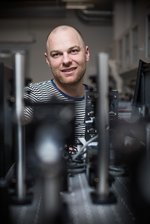
Learning and memory depends on the ability to modulate the connections between neurons in the brain in a process called synaptic plasticity. An important mechanism in synaptic plasticity involves the proteins sensing chemical signals at synapses, neurotransmitter receptors. The NMDA receptor is a neurotransmitter receptor with a key role in learning, which depends on its large intracellular domains. The intracellular domains are intrinsically disordered, are the target of many kinases and bind to many other proteins. Despite its importance, we know little about how the intracellular domains regulate the receptor mechanistically, and little about how intrinsically disordered proteins can exert long-range regulatory effects in general. This is largely due to the almost complete lack of structural information on the intra-cellular domains.
In this project, I will study the intracellular domains of the NMDA receptor using a combination of NMR spectroscopy and single molecule FRET. Structural experiments will be complemented by functional measurements using electrophysiology in Xenopus oocytes. The goal is to identify the mechanism by which the intra-cellular domains affect synaptic plasticity on short time-scales, and how this effect is modulated by phosphorylations and ligand interactions. This will provide another piece of the enigma of how the many wonderful functions of the brain emerge from chemical and physical processes.
Project title:
Can a cooked noodle store information? The mechanisms of disordered proteins in synaptic plasticity
Area of research:
Biophysics of flexible proteins
Fellowship period:
1 Feb 2016 – 31 Jan 2019
Fellowship type:
AIAS-COFUND Marie Skłodowska-Curie fellow

This fellowship has received funding from the European Union’s Seventh Framework Programme for research, technological development and demonstration under the Marie Skłodowska-Curie grant agreement No 609033 and The Aarhus University Research Foundation.
